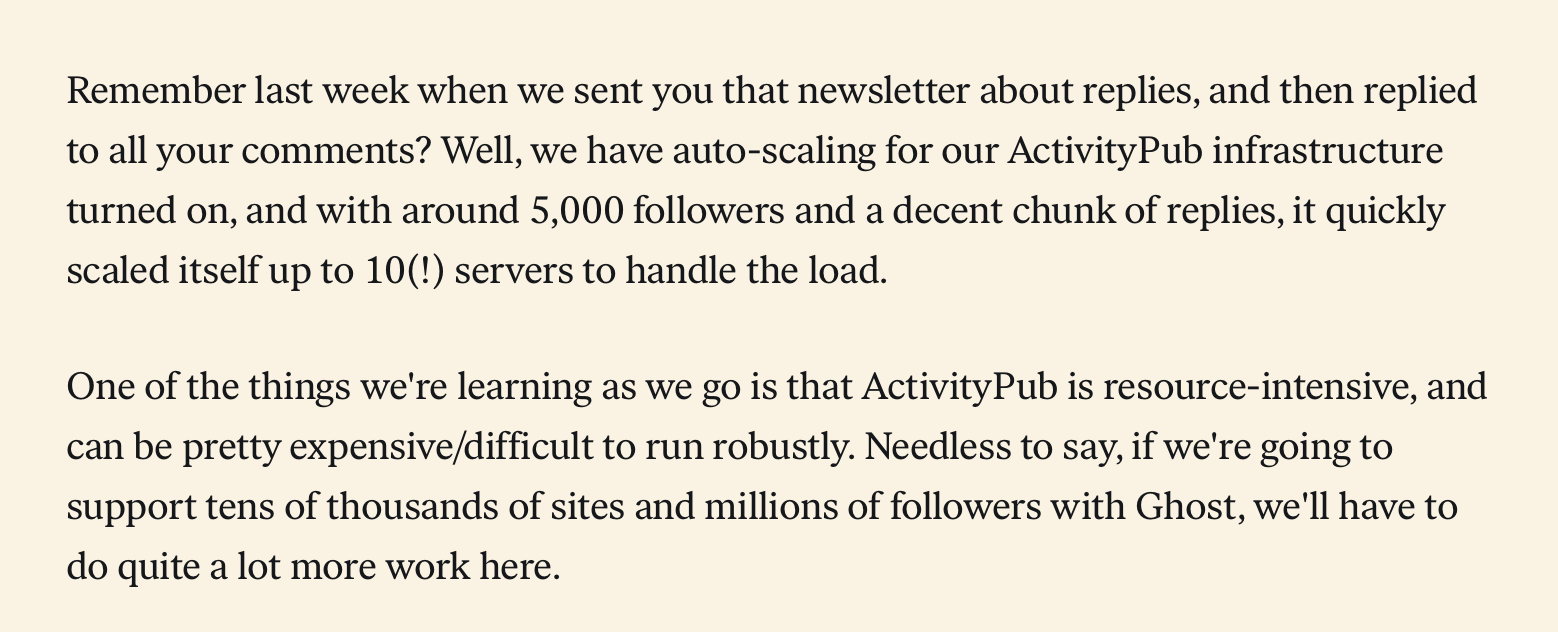I'm sorry, it took *how* many servers to post a single long message from Ghost to 5k fediverse accounts and handle some replies?
-
-
Moose Jolly Holcombreplied to Erin Kissane on last edited by
@kissane there is definitely a cycle of compute is cheap so software is ineffective followed by compute becomes expensive so folks need to make software efficiently again. I knew we were on the cusp of needing to code efficiently again, but this is egregious.
-
Not using a queue is… certainly a choice one can make.
-
@hrefna @thisismissem @jenniferplusplus @kissane @fediversereport
okay...
what's the trade-off for using RSS and webmention instead?
e.g., they pull updates when they get around to it,
you pull logs for webmentions when you get around to it,
otherwise... serve files when asked for em.
-
Jenniferplusplusreplied to Hrefna (DHC) on last edited by
@hrefna @thisismissem @kissane @fediversereport
I'm really inclined to be generous in my read in this case. Ghost's dev team is like 4 people, and they're doing this development and learning in public. I think there's just no concept of out-of-band work in Ghost. They're probably going to need it. Either in the app, or as a standalone service they can farm it out to. But I'm sure they'll figure that out. Hopefully without adding a lot of complexity to the hosting (selfishly, because I host one) -
Hrefna (DHC)replied to Jenniferplusplus on last edited by
Absolutely. It also isn't particularly complicated to add a queue, albeit significantly easier earlier in the dev process, but the logistics of distributing a queue can be much more nuanced.
This does, however, raise questions for me about what their goals are here.
-
Jenniferplusplusreplied to Hrefna (DHC) on last edited by
@hrefna @thisismissem @kissane @fediversereport
That's a fair question. I haven't been able to tell what their goal or strategy is in adding AP integration. It feels kind of like they're going to build it first, and then decide how and why to use it after the fact. And THAT is a choice one can make. -
@jenniferplusplus @hrefna @kissane @fediversereport I should note that @hongminhee is going to do (I think) a benchmark of Fedify with and without a queue, just to have more data.
-
@_elena It's a bit weird, yeah! I have nothing but sympathy for their implementation struggles, and I appreciate them being so transparent, it's just that the business implications were a bit startling.
-
Tbh I appreciate the transparency, even when the implications are startling, in part because it draws out other people's similar struggles. It seems like a whole lot of factors conspiring to be a problem—but also some great people working on those factors.
-
Melroy van den Bergreplied to Erin Kissane on last edited by
@kissane @fediversereport @thisismissem well I'm a contributor to Mbin. So try to rewrite Ghost to PHP
 . Problem solved.
. Problem solved. -
Emelia 👸🏻replied to Melroy van den Berg on last edited by
@melroy @kissane @fediversereport mbin uses a queue iirc, which Ghost isn't currently. That's why it's not as performant as it should be
-
I'm not sure that's actually a useful thing to analyze for these sorts of questions? Like I'd be interested in it regardless, but the reason you generally have a queue is not performance.
(Unless by "benchmark" it means "throughput benchmarking" in which case it is useful but it is really just benchmarking the queue's performance and is highly sensitive to it)
-
But even if it lowered the throughput, it's still not done generally for that reason.
You have queues to smooth out traffic spikes, to provide backpressure, and to give resiliency if a process goes down. Not really for anything you'd benchmark?
-
@hrefna @jenniferplusplus @kissane @fediversereport @hongminhee right, but if you're processing synchronously vs asynchronously, then that'll cause a change it throughput and performance.
-
It does, and maybe I'm misunderstanding, I'm just not convinced it matters when the reason you are doing something is not performance related in the first place.
Like NIO is classically slower than synchronous IO in java, but benefits of NIO aren't about performance but about program design and flexibility with different arch (and if the performance difference is enough to matter you probably shouldn't be using java).
-
Like we'd always benchmark apps with the queue, but comparing them to the non-queue scenario seems very weird to me
Because I can't think of a reason you wouldn't already want a queue in a distributed system like this for non-performance reasons
So of course you benchmark, but only the case with a queue means anything and then you tune your queue against different scenarios, or compare types of queues. If that makes sense
-
@thisismissem @hrefna @jenniferplusplus @kissane @fediversereport @hongminhee it shouldn't really unless the queue itself becomes a bottleneck or conversely enables better fanout
but usually it just shouldn't
-
@thisismissem @hrefna @jenniferplusplus @kissane @fediversereport @hongminhee note that the queue mainly impacts perf when it is the bottleneck or when it enables a better architecture
-
@hrefna @jenniferplusplus @kissane @fediversereport @hongminhee
I think the benchmark is more to show how much faster the activitypub processing is when you defer that work by using a queue vs not, i.e., the HTTP requests duration drops significantly most likely; but autoscaling on open http requests / connections probably isn't right for node.js, instead you'd want a combination of event loop lag, mem/cpu, and open requests

